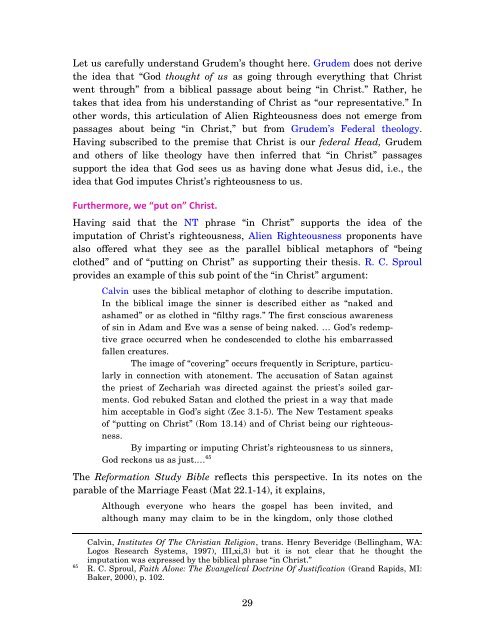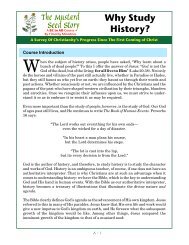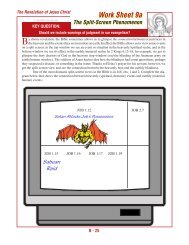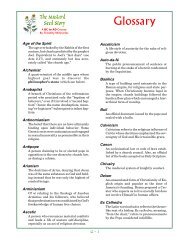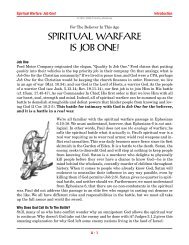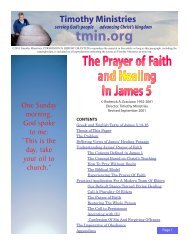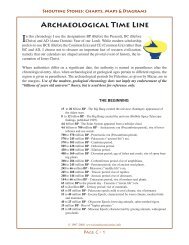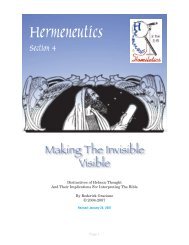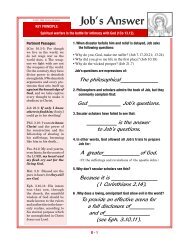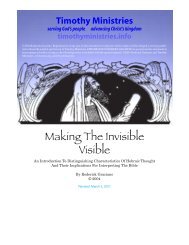Alien Righteousness? - Timothy Ministries
Alien Righteousness? - Timothy Ministries
Alien Righteousness? - Timothy Ministries
Create successful ePaper yourself
Turn your PDF publications into a flip-book with our unique Google optimized e-Paper software.
Let us carefully understand Grudem’s thought here. Grudem does not derive<br />
the idea that “God thought of us as going through everything that Christ<br />
went through” from a biblical passage about being “in Christ.” Rather, he<br />
takes that idea from his understanding of Christ as “our representative.” In<br />
other words, this articulation of <strong>Alien</strong> <strong>Righteousness</strong> does not emerge from<br />
passages about being “in Christ,” but from Grudem’s Federal theology.<br />
Having subscribed to the premise that Christ is our federal Head, Grudem<br />
and others of like theology have then inferred that “in Christ” passages<br />
support the idea that God sees us as having done what Jesus did, i.e., the<br />
idea that God imputes Christ’s righteousness to us.<br />
Furthermore, we “put on” Christ. <br />
Having said that the NT phrase “in Christ” supports the idea of the<br />
imputation of Christ’s righteousness, <strong>Alien</strong> <strong>Righteousness</strong> proponents have<br />
also offered what they see as the parallel biblical metaphors of “being<br />
clothed” and of “putting on Christ” as supporting their thesis. R. C. Sproul<br />
provides an example of this sub point of the “in Christ” argument:<br />
Calvin uses the biblical metaphor of clothing to describe imputation.<br />
In the biblical image the sinner is described either as “naked and<br />
ashamed” or as clothed in “filthy rags.” The first conscious awareness<br />
of sin in Adam and Eve was a sense of being naked. … God’s redemptive<br />
grace occurred when he condescended to clothe his embarrassed<br />
fallen creatures.<br />
The image of “covering” occurs frequently in Scripture, particularly<br />
in connection with atonement. The accusation of Satan against<br />
the priest of Zechariah was directed against the priest’s soiled garments.<br />
God rebuked Satan and clothed the priest in a way that made<br />
him acceptable in God’s sight (Zec 3.1-5). The New Testament speaks<br />
of “putting on Christ” (Rom 13.14) and of Christ being our righteousness.<br />
By imparting or imputing Christ’s righteousness to us sinners,<br />
God reckons us as just.… 65<br />
The Reformation Study Bible reflects this perspective. In its notes on the<br />
parable of the Marriage Feast (Mat 22.1-14), it explains,<br />
Although everyone who hears the gospel has been invited, and<br />
although many may claim to be in the kingdom, only those clothed<br />
65<br />
Calvin, Institutes Of The Christian Religion, trans. Henry Beveridge (Bellingham, WA:<br />
Logos Research Systems, 1997), III,xi,3) but it is not clear that he thought the<br />
imputation was expressed by the biblical phrase “in Christ.”<br />
R. C. Sproul, Faith Alone: The Evangelical Doctrine Of Justification (Grand Rapids, MI:<br />
Baker, 2000), p. 102.<br />
29


